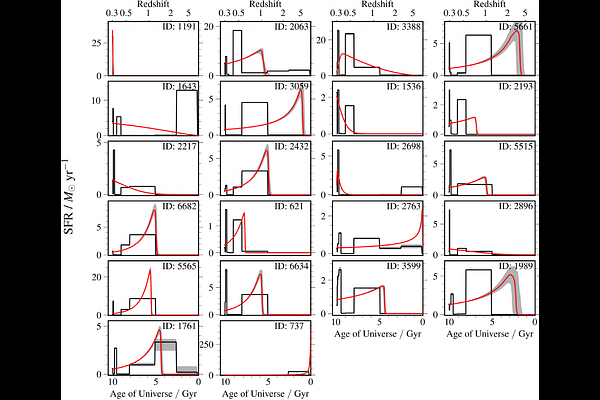Probing Obscured Star Formation in Galaxy Clusters Using JWST Medium Band Images: 3.3$μ\rm m$ PAH Emitter Sample in Abell 2744

Probing Obscured Star Formation in Galaxy Clusters Using JWST Medium Band Images: 3.3$μ\rm m$ PAH Emitter Sample in Abell 2744
Cheng Cheng, Xin Wang, Piaoran Liang, Fengwu Sun, Edo Ibar, Malte Brinch, Haojing Yan, Jia-Sheng Huang, Jun Li, Juan Molina
AbstractStar-forming galaxies in galaxy clusters play a crucial role in understanding the advanced stages of galaxy evolution within dense environments. We present a sample of 3.3$\mu$m PAH-bright galaxies in the Abell 2744 (A2744) galaxy cluster. Using F430M medium band images, we select PAH emitters in the galaxy cluster, which capture the 3.3$\mu$m PAH emission at the redshift of A2744. Our multi-wavelength study demonstrates consistent star formation rates (SFRs) derived from PAH emission and SED fitting, indicating the 3.3 $\mu$m PAH flux estimated from medium band image alone can reveal the entirety of star formation, immune to dust obscuration. We find that the PAH emitters are located in relatively low mass surface density regions of A2744, with SFRs aligning with the field star-forming main sequence at $z=0.3$. The PAH emission morphologies show more asymmetry than that of the F444W image when asymmetry index $> 0.4$. With these results, we suggest that these star-forming galaxies in A2744 are in the stage of falling into the cluster from the field, and have not been quenched yet. We further explore a potential link between these galaxies and cosmic filaments being accreted onto the cluster, which may channel gas inflows to fuel star formation. JWST medium-band imaging provides a powerful new tool for identifying heavily dust-obscured star-forming populations. Future HI and low-J CO observations should be prioritized to resolve the cold gas kinematics and star formation processes in these systems, which would directly test the role of environmental stripping versus filamentary gas supply.